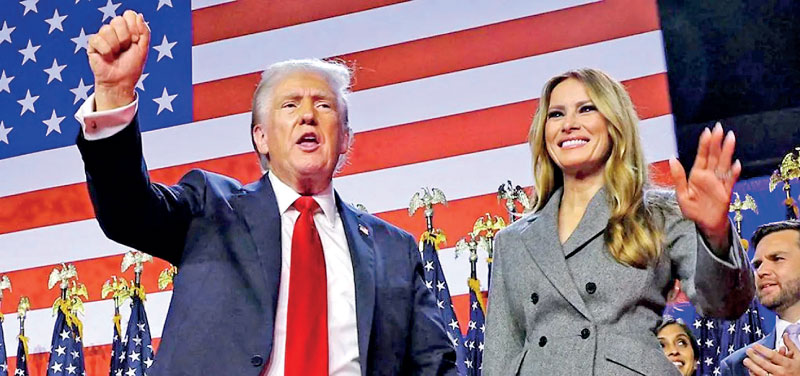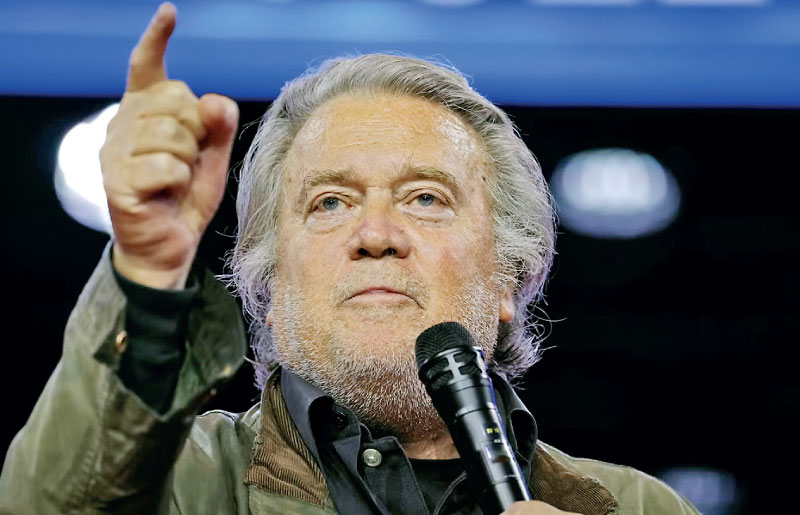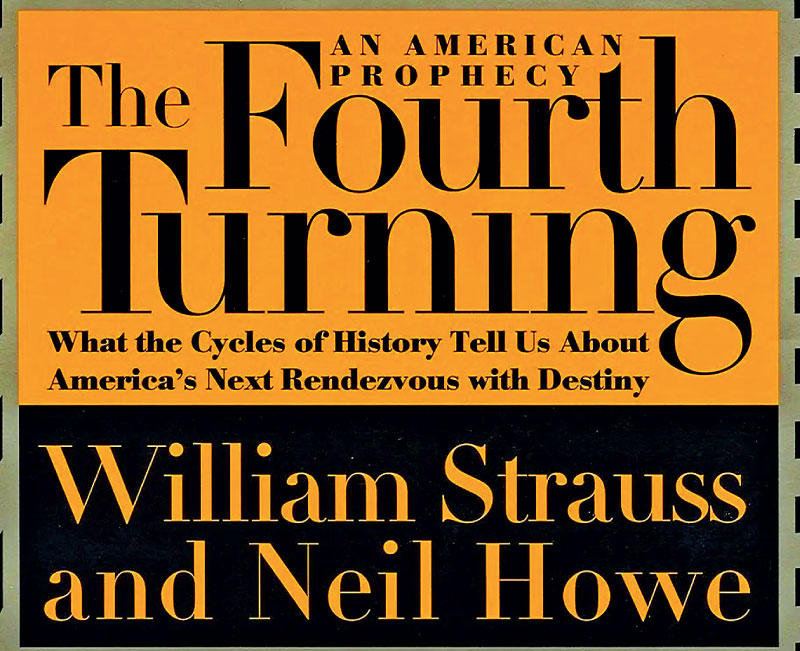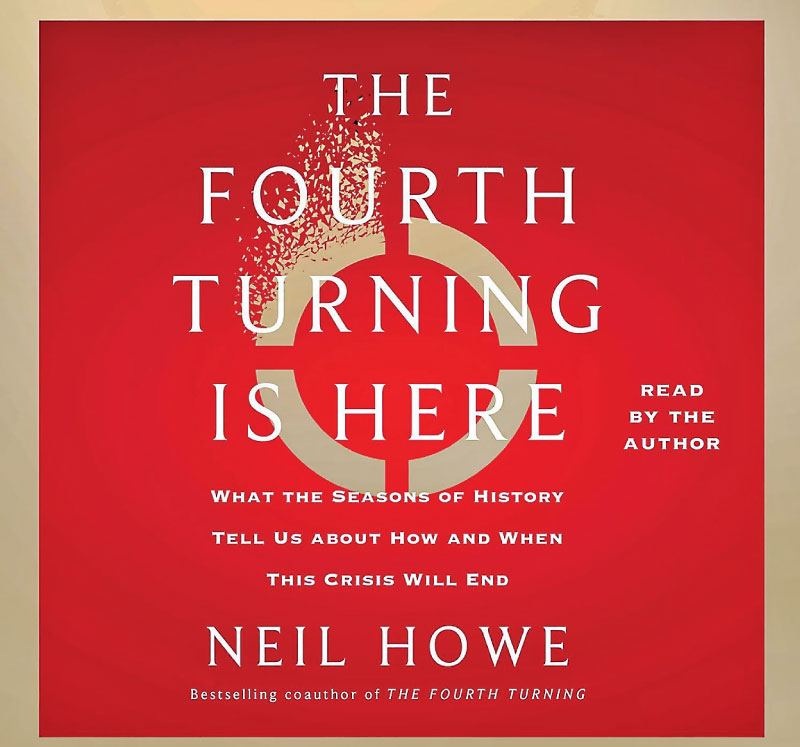Wednesday Feb 18, 2026
Wednesday Feb 18, 2026
Thursday, 14 November 2024 00:45 - - {{hitsCtrl.values.hits}}

Trump triumphant
 President Trump actually thought that Kamala Harris, a feminist progressive-liberal, was a “radical-leftist, Marxist, Socialist, Communist”.
President Trump actually thought that Kamala Harris, a feminist progressive-liberal, was a “radical-leftist, Marxist, Socialist, Communist”.
The Trump administration and a Republican Senate are going to regard a JVP-NPP regime in the Indian Ocean headed by JVP leader Anura Dissanayake, pale-pink NPP frill, crony corporate décor and all, differently from the way a Democrat White House and Senate did.
Revolution/Counterrevolution
The multidimensional triumph of Donald Trump is an outcome I hardly applaud, but as a political scientist and former diplomat, I cannot fail to note its magnitude, even epic character, and respect the political achievement.
Was it a counter-revolution or a revolution? Critics would argue the former; fans, the latter. It is like those two-dimensional pictures we had as postcards or key-tags when we were schoolkids. It all depends on which side you tilt it; which angle you view it from.
Serious students of politics are aware of certain episodes in history which are of a dualistic or hybrid character. Take Napoleon Bonaparte. Was his accession to power, period of rule and role in history counterrevolutionary, revolutionary or a mix of both? The settled scholarly view is the third. He was counterrevolutionary in relation to the Jacobin phase of the great French Revolution and in his coronation as Emperor, and revolutionary in that his armies carried several ideas of the French Revolution across the European continent while fighting the older, more conservative empires.
The same was held to be true of Stalin by his most famous rival Leon Trotsky and Trotsky’s biographer Isaac Deutscher.
Watching on CNN the Trump wave build and make landfall, hit me like a hammer-blow in the chest. It isn’t that I was sure Trump would lose. Not even the usually prophetic Prof Alan Lichtman had entirely convinced me with his certitude that Kamala Harris would win. I wrote two columns ago on Oct 31st:
“…But the contest is scarily close and he [Donald Trump] might become president.” (https://www.ft.lk/columns/Examining-Elpitiya-Israeli-Zionist-beachheads-Anura-s-inaction-and-Prabhakaran-s-profile/4-768630)
The hammer-blow I felt in my chest was not because of the shock of the mere fact Trump’s victory, but because of two other reasons. It was the defeat of my America, the USA whose culture I had grown up with and within from childhood, and had spent time in (including a postgrad stint) almost 10 times over the decades. I was much more a late-modernist than a feminist post-modernist, but my side in the Culture Wars had lost.
The second reason for my shock was that my USA, the USA of Bruce Springsteen and Barack Obama, had not just lost but lost really big, and Trump and his America—the guys in the flatbed truck who had shot-gunned the Easy Rider (Peter Fonda) and his companion (Dennis Hopper) off their choppers in 1969 —had won really big.
Trump and his Republicans won vertically and horizontally. They won the White House, the Senate and some state-wide referenda on Roe v. Wade. They already have the Supreme Court. It is a total triumph.
Trump’s triumph was no mere electoral success. It had deep roots, social and historical. Some Western political theorists such as Prof John Kane (my doctoral thesis supervisor) had in an analysis of the first Trump presidency and the Jan 6th putsch, traced those roots back to the American Civil War, implying that the Trumpism and the Trump bloc are manifestation of a northwards creep of the militarily defeated but ideologically never dead ideas and values of the Southern Confederacy. Others too have tracked the trend through phenomena and personalities from Barry Goldwater to Pat Buchanan.
In a protracted, molecular war of attrition of a counterrevolutionary or counter-reformation character, the Confederate South seems to have won the Civil War or a sequel to it. Yesterday’s lunatic fringe has become today’s mainstream.
Steve Bannon and Strauss-Howe
Like every real revolution or counterrevolution, the Trump triumph had its chief theoretician, ideologue and strategist: Steve Bannon, who had until a week before the election, been in jail for contempt of court—failing to answer summons about the Jan 6th attack on the Capitol. His release came in time to witness the historic success of his political and ideological project.
Bannon provided the intellectual and ideologic argumentative drive, but he too had been inspired by another source, a most interesting work of social science and ‘big history’. It was called ‘The Fourth Turning: An American Prophecy’ authored by William Strauss and Neil Howe. Its subtitle or ‘strap’ was compelling: ‘What the Cycles of History Tell us About America’s Next Rendezvous with Destiny’. (https://www.amazon.com/Fourth-Turning-American-Prophecy-Rendezvous/dp/0767900464)
The ambitious book analyzed the history of the United States and then extended it to the Western world, setting out a pattern that the authors had perceived, of stages that societies pass through, each with its own defining dynamics, tasks, characteristics and zeitgeist. Each stage brings to the forefront a different generation belonging to a distinct archetype with a distinct mindset. These stages repeat each other in a cyclical pattern. Roughly speaking, the undergirding logic of the ‘cycles’ in the Strauss-Howe theory corresponds to Joseph Schumpeter’s idea of ‘creative destruction’.
The authors posited the proximate fourth stage or ‘turning’, which is always that of a breakdown and revolution of some kind culminating in radical renewal, as having commenced with the economic crisis of 2008 and culminating in 2025.
In a sequel ‘The Fourth Turning Is Here’ the surviving author has posited the climax of the current crisis, culminating in wars and containing the possibility of a new golden age of America in the early 2030s. (https://www.simonandschuster.com/books/The-Fourth-Turning-Is-Here/Neil-Howe/9781982173739)
Steve Bannon was convinced by this grand schema. It meant that the radical-populist revolution building up against the established elites which he heard and felt in the consciousness and chatter of the white Christian ‘organic’ subaltern classes; the revolution Bannon saw and sought, was not only desirable but actually possible, probable and on the horizon. The Strauss-Howe study confirmed to Bannon that it accorded with the tide and timetable of history. All that was needed was to keep pushing and coming back even when defeated as in 2020, until the historical moment actually arrived. It sure looks like Steve Bannon’s gamble paid off.
There is a darker underpinning of the Trump triumph: the popular metaphysics of Armageddon, of the ‘End Times’, not in the rendition by Catholic or Christian theology but in the demented psychological universe of a toxic new brand known as Christian-Zionists or Christian Evangelical Zionists (of which a small segment exists in Sri Lanka too). The ‘Rapture’ series was their manifestation in popular culture. They expect the anti-Christ to rise in the Middle Eastern region which will lead to a world war after which Christ will arrive. They are therefore nor averse to triggering such an Apocalyptic war.
This recalls to my mind the warning by Jesus in the New Testament that there will be “wars and rumours of wars” spread precisely by “false prophets”.
Liberal-left blindspot
At an intellectual and analytical level, the crushing defeat of the courageous Kamala Harris and the Democrats is no surprise to me. The critique being levelled at the US Democrats, liberal-democrats more broadly, and the new progressive-liberalism which privileges gender and identity issues over class, thereby leaving the space wide open for radical right populists and ultranationalists to pick up the vote of the working people, hard-pressed middle classes and non-college educated, has been made by many, over time.
I too had contributed modestly to the debate, applying Antonio Gramsci, in US academic sites and an anthology a few years back. An extract from one my contributions from 2017 follows:
“…Somewhere along the line, perhaps in reaction to class reductionism, the leftwing political movements in the West forgot about class and substituted identity and gender instead. The right picked it up. The left also forgot about nation and patriotism—and the right picked them up as well. Meanwhile, if you were in the Third or Second worlds, the radical religious right picked them up.
…Something is desperately awry when the leadership of the left is unable to relate to the angst of working people, the directly productive working classes. There was a Third world within the First and they weren’t only people of color, many were poor and white as well.
The liberal left in the US was far too enamored of the need to defend the Obama “revolution,” yet the mistakes began at the very outset of his presidency with the bailout of the banks instead of a Rooseveltian New Deal, and ended with the folding of the Obama legacy back into the Clintonian heritage and candidacy. The progressives were too far from Bobby Kennedy of the ‘68 campaign, too much in tune with Hillary and too little with Bruce Springsteen’s blue-collar blues.
The second greatest failure of contemporary progressives and the left, which must be addressed in order to construct a new public imagination, are the unavoidable issues of the nation, nationalism, and patriotism. Suffering in a fascist jail, Antonio Gramsci wrestled with what had gone wrong in his time and what needed to be done to put it right. Our left contemporaries learned from much of what he wrote on hegemony and culture but missed one of his most important themes, that of the nation, nation building and state building. He understood that the left had abandoned those tasks and argued that picking up where Machiavelli left off was a task of the left, by which he meant wrestling with the tasks of nation and state building. Indisputably an internationalist, he notably criticized “cosmopolitanism” as a doctrine that hampered the task of nation building.
…All round the compass, nationalist populism, even when it doesn’t enjoy an arithmetical majority, seems to embody the Rousseauvian general will. This is a symptom that cannot be ignored.
The contemporary left abandoned Gramsci and instead embraced cosmopolitanism—and has paid the price. As with every serious revolutionary from Mao and Ho Chi Minh to Fidel Castro and Amilcar Cabral, Gramsci combined class, mass and nation into a bloc, and it was a “majoritarian” bloc in the best sense of the word, not a collocation of minorities.
A neo-progressive project needs to grapple with the crisis of neoliberalism…eschewing right-wing nationalism while refusing to concede the nation and patriotism to the right. This project must turn to Gramsci so as to rediscover and re-appropriate the nation, reimagine a “people-nation” and build a “national popular” bloc. Intellectuals such as Eric Hobsbawm and Stuart Hall diligently deployed Antonio Gramsci’s thinking to unpack Margaret Thatcher’s authoritarian populism and its reworking of nationalism. They prescribed the application of Gramsci’s concept of the “national popular.” Meanwhile, in the USA, a witting or unwitting ‘neo-Gramsci Lite’ helped shift the Democratic Party to its winning Clintonian culture in the 1990s. While its strength was that it outlined a new strategy, its weakness was that it did not outline a new public imagination…”
(https://globalejournal.org/global-e/march-2017/great-gramsci-imagining-alt-left-project)
The essay from which these passages were excerpted was republished as a chapter in the volume On Public Imagination co-edited by Prof Richard Falk, emeritus professor of International Law at Princeton. (https://www.taylorfrancis.com/chapters/edit/10.4324/9780429343599-24/great-gramsci-dayan-jayatilleka)
US Democrats will have to win back the working people including the white working class, and rebuild the coalition that helped them win the last time they won. The idealist in me hopes that that after a polarizing Trump term, the Democrats will opt for and win with Alexandria Ocasio-Cortez (AOC), but the realist in me says they will be safer with a young approximation of Joe Biden, Bill Clinton, Barack Obama or Bernie Sanders. It’s a ‘long goodbye’ (Raymond Chandler) to the dream of a woman of colour as President of the USA.
Trumpism and the world
The world-order in uneven transition to multipolarity will be rocked by the impact of the Trump project. Even before he assumes office in January, and in the twilight of Biden, US mentality and behaviour have changed. Washington has told Qatar that it wants the Hamas offices there shut down and Hamas evicted. Qatar has suspended its negotiating role. How (outgoing) CIA Director Bill Burns will continue to negotiate with Hamas for a ceasefire is a mystery.
The Trump Presidency has bitter enmity towards Iran and may take military measures against it, unilaterally or in conjunction with Israel. It was Trump, not Netanyahu, who assassinated Iran’s General Qassem Suleimani. (The Israelis declined to participate.) Iran’s nuclear power facilities could be the target. Iran is bound to retaliate asymmetrically. US troops could be dying in the deserts, mountains and cities of the greater Middle East for decades.
If Marco Rubio is Secretary of State, the hysteria against Cuba will renew. Unprovoked Cold War against Cuba, taken together with likely forced deportations of illegal immigrants as well as undocumented persons even if they are spouses of US citizens, will chill relations between the USA and Latin America—with the exception of Argentina’s Milei.
Most portentous will be the competition between the USA and China coming under the management of the generally xenophobic and specifically ‘economic Sinophobic’ Trump team. The Trumpian Republicans tilt towards Taiwan could take the form of turning the island into a mini-Israel or Ukraine aimed at China. What China’s legitimate threat-perception and response would be is anyone’s guess.
The only constructive Trumpian engagement could be on the Russia-Ukraine front. There is an ideological, though not strategic, compatibility between the Trump and Putin social blocs. Russia is not neo-Soviet or ‘Stalinist’. Its ruling ideology is a conservative Christian nationalism. It is not anti-imperialist in a Leninist or Stalinist sense. It is against the ‘liberal international order’ partly because it is ‘liberal’. Russia’s ruling ideology is ‘civilizational’ but that civilizational identity is dualist. It sometimes sees itself as Eurasian, and at other times as the last redoubt of Western civilization. Its identification within Western civilization is far more with the Western Christian Right –which stands in contradistinction to Pope Francis’ progressivism--than its left, progressives or left-liberals.
Trump will prefer to wean Russia from the embrace with China and ‘Greater Eurasianism’ by freezing the Ukraine-Russia front. Putin’s Russia may use any opening with Trump’s USA and Western conservatism to restore a tripolar Great Power equation, holding the balance between USA and China.
Even more than in 2016 and during the previous George W. Bush administration, the USA will be shedding ‘soft power’ under the incoming Trump administration, i.e., the power to persuade not through the ‘hard power’ of military might but rather through your cultural appeal and the attractiveness of your ideas and social model.
It is possible to dominate for a short period in certain geographic theatres without soft power, but it is not possible to sustain hegemony without ‘soft power’. No nation stays hegemon through hard power alone.
Trump’s will be a presidency of polarisation both within America and between the American government and the majority of the world’s people. As the African liberation movements fighting Portuguese colonialism in the 1960s and ‘70s used to say: ‘A Luta Continua!’ (‘The Struggle Continues!’).

Steve Bannon: Ideologue, chief strategist

The book

The sequel